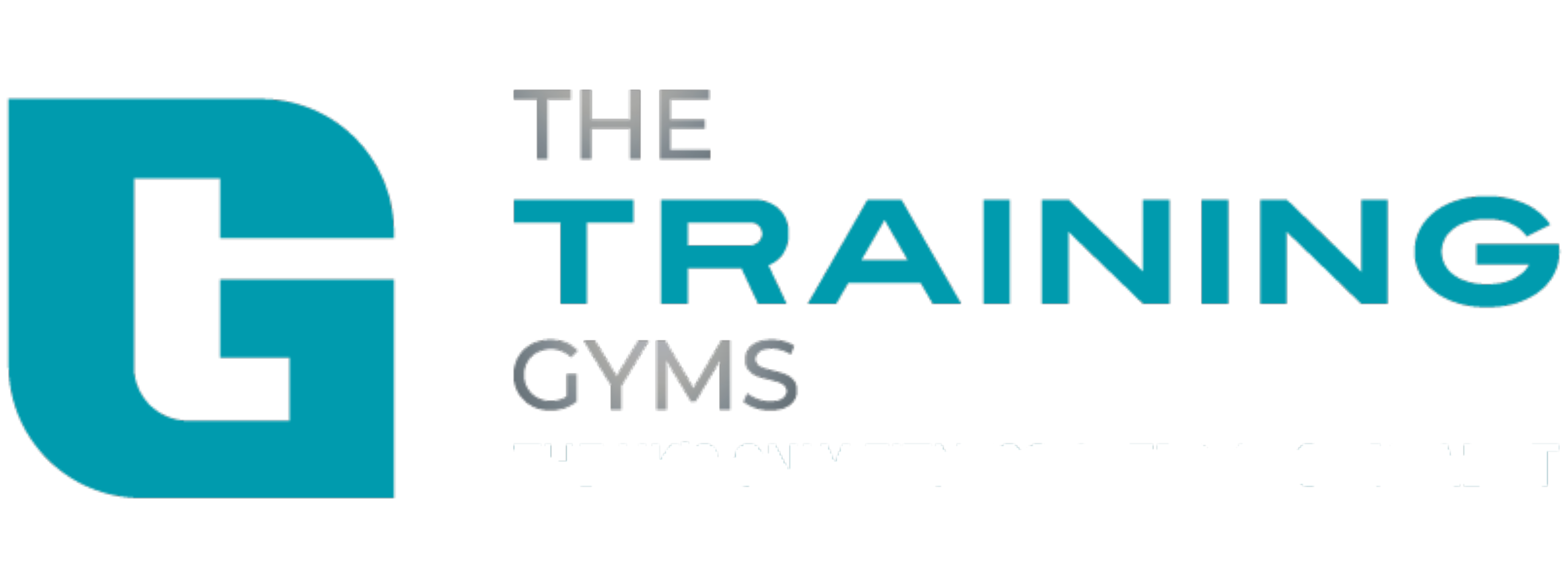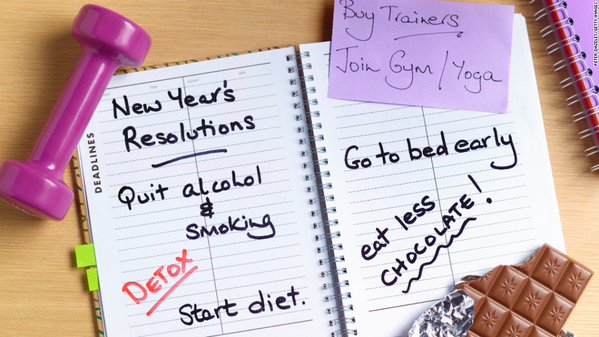Christina: This is Christina with the DVCC and today I’m joined with Nathan, trainer at the DVCC’s Milton Keynes location, to discuss something that we probably all do – New Year’s resolutions.
Nathan, we’re here today to talk a
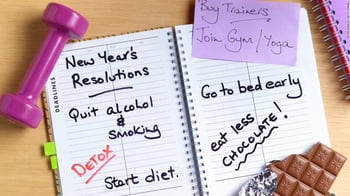
bout New Year’s resolutions; what are your thoughts on people setting themselves objectives for the coming year?
Nathan: I think setting goals is very important; usually, smaller goals seem to work best to begin with. It is important to have a big objective, but it’s equally important to have the smaller, more achievable goals which will help you to achieve the big goals.
I think a lot of people get to the turn of the New Year and they think, ‘ok I want to lose weight,’ but they don’t really think about how much weight they want to lose or how they’re going to achieve that goal, and they just go into the New Year with the thought of ‘I’m going to lose weight’ and they don’t do any planning behind what they want to achieve.
Christina: What, in your opinion, would be a good goal to set?
Nathan: It’s got to be specific and measurable, so if you were trying to lose weight or build muscle, then you have to find some kind of specific, almost end date to that goal.
A lot of people might not like the idea of having an end date, but what normally happens is when you get towards that end date, you start to have other goals that come in, so you continuously move your goal the closer you get to it. That’s one of the main things people need to do, to choose something and then put a specific timescale and how much weight they want to lose or how much muscle they want to build to it.
Christina: For example, instead of saying in 2016 I want to lose weight, what would be a better way of setting that?
Nathan: Saying ‘I want to lose maybe a stone of body fat in 2016’ or ‘I want to fit into a size 12 dress or pair of jeans,’ coming down from maybe a size 14; something that you can actually get to that point and think, ‘wow I’ve actually completed this goal, I’ve actually done it,’ rather than ‘I just want to lose weight,’ this can kind of fluctuate. You can lose a little bit of weight and then think, ‘I’ve lost weight and now I’m going to go back to my normal way of eating,’ and that weight you’ve lost might come back on.
Christina: So the best idea then, instead of saying ‘I want to lose weight,’ we need to be thinking about putting a number on that, whether it’s a stone or half a stone or two stone.
You mentioned, as well, something to do with time limits; what’s a realistic kind of time frame for losing, let’s say, a stone?
Nathan: Depending on what you’re doing, you could lose a stone in probably six weeks if you were following a good nutrition programme and training quite regularly, you could probably lose a stone quite quickly.
A lot of people tend to make goals too short term or too long term; I always find with our clients it’s best to set small weekly goals, then monthly goals and then a yearly goal as well.
Christina: Then I guess that each time they reach their goal, they get an incentive to move on to the next goal.
Nathan: Correct, yes.
Christina: So, no more writing down ‘I’m going to lose weight’ and then putting it off until next month or next month.
Nathan: Yes, exactly.
Christina: You mentioned something about specific goals, quantifiable goals; what’s the difference between a vague goal and a quantifiable goal?
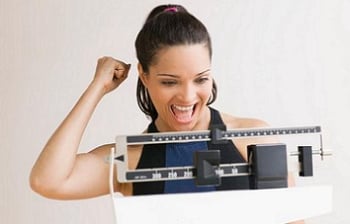 Nathan: Having a vague goal, such as wanting to lose weight and get fit, is just not the best type of goals to have; as I said, they’re not very specific, so you’ve got no way of really measuring how close you are to achieving them. That specific goal would be something that you have a target to work to and then that goal can be broken down into more manageable bite size chunks.
Nathan: Having a vague goal, such as wanting to lose weight and get fit, is just not the best type of goals to have; as I said, they’re not very specific, so you’ve got no way of really measuring how close you are to achieving them. That specific goal would be something that you have a target to work to and then that goal can be broken down into more manageable bite size chunks.
One of my goals last year was to add 10lbs of muscle; I broke it down that I’d need to add just over a pound of muscle a month, which I achieved. But what a lot of people might have done would be just to say, I just want to add muscle; there’s no specific areas where they’re looking at building muscle: are you looking at building on your upper body, your lower body, all over? So it’s very important to be as specific as you can be about what you want to achieve and that will actually help you to get to those goals.
Christina: That’s brilliant. So you did actually achieve that goal last year?
Nathan: Yes.
Christina: Well done! Statistically, less than one in ten people achieve their New Year’s resolution.
Nathan: Yes, it’s not something that I often do, but last year, Josh – the DVCC manager at Bedford – had written down quite a lot of goals and they were very specific; a lot of them were to do with weightlifting and trying to hit certain amounts of weight lifted. That really inspired me so I just took the one of building muscle and went with that and yes, I seemed to do ok with it.
Christina: Brilliant. This is probably a lot of people who are maybe new to health and fitness or new to thinking about an exercise regime, they might write down ‘I want to lose weight next year.’ But what about clients that are exercising regularly and eating well; what’s a good goal for them to set for 2016?
Nathan: It’s quite a hard one, for me to give somebody a goal if they’re already eating well or if they’re already training. It could be to exercise maybe a little bit more, or exercise with more intensity; move up a couple of kilograms in dumbbell weight when you’re doing certain exercises.
It could be eating more meals throughout the day, because a lot of people do eat very healthily but they don’t eat as often as they could do: a lot of people have three meals a day and if they are healthy, that’s very good, but eating smaller meals at more regular frequencies is actually more healthy, it allows your hormones to regulate better and allows your metabolism to work faster as well. So goals like that could be quite a good one.
Christina: We’ve already discussed really, for people that want to start the fitness regime next year, I assume January would be one of your busiest times at the DVCC, is that right?
Nathan: Yes, in January we’re very busy at the DVCC but really across the whole fitness industry you see quite a big peak in people wanting to change.
What we try and do at the DVCC is basically keep people motivated and try and prompt that change of lifestyle, rather than just a short term change, because it can be very easy to think ‘It’s January I’m going to hit it hard,’ and then the end of January comes and people think ‘I’ve achieved my goal and can go back to whatever I was doing before.’ Obviously, if you’re wanting to make a change in January, you probably want to continue that change throughout the rest of the year so it’s very important between January/February time to keep the motivation up.
Christina: Especially with all the cold and short days ahead.
Nathan: Yes, exactly.
Christina: You mentioned keeping up the motivation; how do you do that, how do you help people to stay motivated to carry on with their weight loss or weight gain programme?
Nathan: There are a couple of ways: at the DVCC we train in small groups and that really helps to keep accountability between our clients. A lot of people go to gyms by themselves and even myself and a lot of my colleagues will probably say training by yourself sometimes can be hard, it can be hard to motivate yourself.
But when you have the accountability of knowing that you’re going to train with other people and they might wonder where you’ve been if you’re not there, it really does build that accountability and keeps you motivated to keep going and you see other people get results.
We also use a process called the Progress Tracker, which is done every week to every two weeks; during the Progress Tracker we use our state of the art in-body analysis machine to track our clients’ results. This helps to keep attendance very high because clients know that they are keeping their progression up and they’re getting closer towards their goals.
Another way that we keep people motivated is by changing the phase of training, so once every four weeks we change the overall structure of our programme to make sure that clients aren’t coming in and doing the same exercise or the same routine day in, day out, and that allows people to stay motivated as well.
Christina: So it’s keeping it varied as well; varied, interesting, a bit of group support. And the Progress Tracker, is that weighing people? What else do you do?
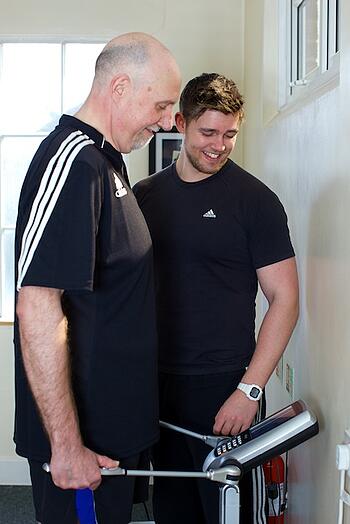 Nathan: It’s done on our in-body analysis machine, so we tend to stay away from the weight aspect of things. What we do is we break down body fat and skeletal muscle mass, so that way, rather than just giving people an overall number of weight, we can say, ‘you’ve lost 2lbs of fat this week and you’ve gained a pound of muscle.’
Nathan: It’s done on our in-body analysis machine, so we tend to stay away from the weight aspect of things. What we do is we break down body fat and skeletal muscle mass, so that way, rather than just giving people an overall number of weight, we can say, ‘you’ve lost 2lbs of fat this week and you’ve gained a pound of muscle.’
That’s quite a big difference to if you were just to compare it to weight; if you did lose 2lbs of fat and lose one pound of muscle, you’d show a net weight loss on the scales of a pound, whereas in reality you’ve lost 2lbs of fat and built an extra pound of muscle which is a significant difference.
Christina: Yes and definitely much more motivating as well because people could get disillusioned if they think that they’re not losing weight.
Nathan: Definitely, and that’s one thing that the Progress Tracker is really good for; it shows complete breakdown, whereas a lot of people will weigh themselves on the scales but they might weigh themselves at different times of the day. There are loads of different things that can be factored in that wouldn’t give you a very accurate result, whereas the in-body analysis machine breaks everything down and we tend to ask our clients to come in at the same time each week to get themselves measured.
Christina: So would you encourage your clients not to weigh themselves every day?
Nathan: Yes I definitely would. Weighing yourself every day, your weight can fluctuate every six hours; you could weigh yourself in the morning and weigh yourself in the evening and you could have put weight on or lost weight.
Hydration levels, the intake of food: if you weigh yourself in the morning on an empty stomach and then you weigh yourself again in the evening when you’ve eaten and you’ve drunk fluids, no doubt you’re going to weigh more. Weighing yourself every day is not something that I would advise doing. If you are going to weigh yourself, the best time to do it is in the morning around the same time, before you’ve eaten.
You want to do it as accurately as possible, under the same circumstances, so if you weigh yourself in just your underwear, the next time you weigh you want to wear the same things, you don’t want to be wearing a coat or a heavy pair of jeans or something along those lines, because it won’t show an accurate reflection of your weight.
Christina: And it’s going to put you in a bad mood for the rest of the day.
Nathan: Exactly.
Christina: That’s the exercise side of things; how else do you help people make a drastic change to their eating and lifestyle habits?
Nathan: This is another thing; we use the DVCC transformation habits. What we’ve found is that some people can make very drastic changes, but for a lot of people that try to make massive changes all at once it can be very challenging.
Using the DVCC transformation habits, what we do is give our clients one habit which they can focus on which will give them the very best results. So when they’ve made that particular change a habit and they’ve formed it and are doing it regularly, we give them another one to focus on; this really helps to build confidence in themselves and helps them to adopt a healthier lifestyle.
Christina: So it basically comes down to the same idea; breaking everything down into manageable and bite size pieces.
Nathan: Yes, because if you came to exercise, at any fitness centre, and someone told you that you need to train six times a week, you need to drink five litres of water, you need to eat only chicken, you need to eat vegetables with every meal and you can’t have any x, y or z, that’s a lot of stuff that you’re putting on yourself at once.
What I have noticed is that if you do give people too much to handle, when one thing breaks, normally everything breaks. People can feel like they’ve become a failure and they will just stop everything and just go back to the way they were. So it just seems more manageable to add one thing in at a time and results can still go well by doing that.
Christina: Definitely. And how about you for the coming year, have you made any resolutions?
Nathan: I haven’t at this moment; I’m currently thinking about what I want to do but I haven’t made any as of yet. I’m going to sit down, probably tomorrow, and have a little think.
Christina: We’ll watch this space then, Nathan!
Nathan: Yes!
Christina: Ok, thank you very much.
Christina: The DVCC has centres in Bedford, Milton Keynes, Northampton, Hitchin and very shortly Stevenage and Central Bedfordshire. So if you’ve been listening to this interview and you’d like to find out more about how the DVCC can help you, then please book an appointment for a DVCC 60 minute discovery call, at www.theDVCC.com/signup.
